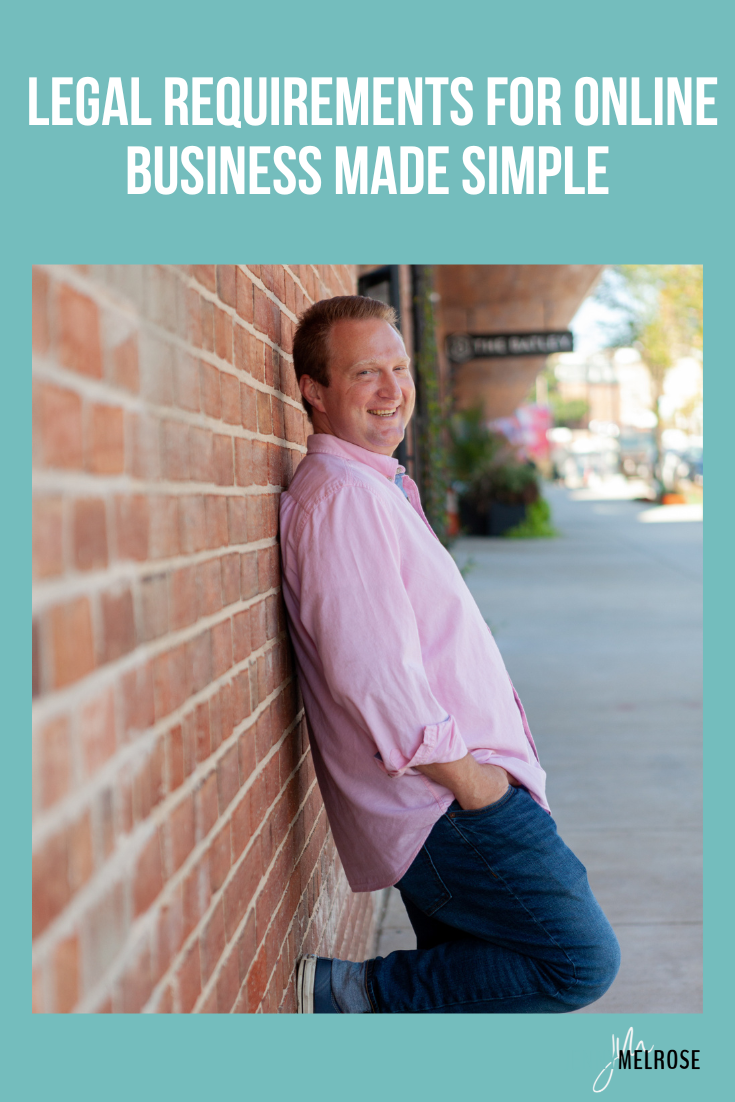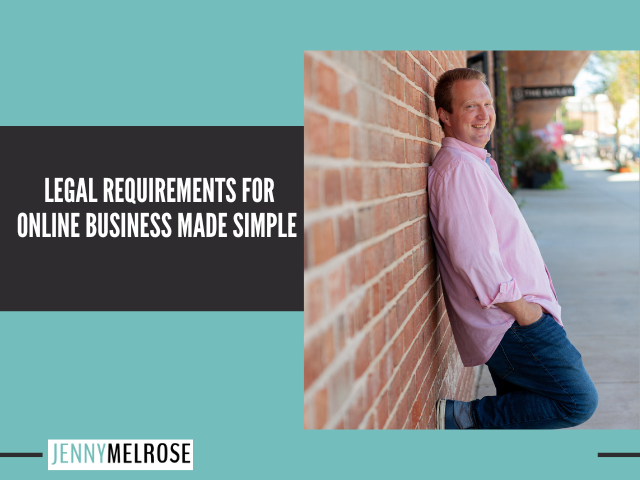Learn the essential legal requirements for running an online business — from contracts and disclosures to trademarks and privacy policies — explained in simple, easy-to-understand terms so you can protect your business with confidence.
IE 467: Legal Requirements for Online Business Made Simple with Bobby Klinck

Are you running an online business and not sure about what legal requirements you need to have? Could you possibly end up with a big lawsuit or get yourself shut down? In today’s episode, we are going to make sure that we let you know the legal requirements that you need to run your online business confidently. Bobby Klink is the owner of Plainly Legal, an affordable option for legal solutions for your business.
Before diving into the topic of legal requirements for online businesses, attorney and entrepreneur Bobby Klinck shared a bit about his background and how his own experiences shaped the work he does today.
A Harvard Law School graduate and former Justice Department prosecutor, Bobby spent nearly a decade in traditional law before realizing it didn’t quite fit who he was. A self-described “punk rock kid from Texas,” he wanted to do something more entrepreneurial and people-focused.
In 2010, he joined a small law firm but made what he now calls a “quintessential entrepreneurial mistake.” Though he was called a partner, he had no real ownership or equity in the business.
That decision led to financial uncertainty and, eventually, a painful split when his daughter was just three months old. The experience taught him firsthand how crucial it is to handle legal and partnership details early before problems arise.
Determined to do things differently, Bobby launched his own law firm in 2014. Over time, he became immersed in online marketing and began focusing on helping online entrepreneurs, coaches, and course creators protect their businesses legally. What started as Your Online Genius evolved into BobbyClink.com, and today, his work continues through Plainly Legal, a software platform designed to make legal compliance simple and accessible for online business owners.
Many entrepreneurs jump into business without thinking about the legal side. Why is that risky?
It’s risky because when you skip over the legal details early on, you might be setting up hidden problems that won’t show up right away. Think of them like landmines buried in your business. Everything seems fine at first, but later—often when it’s most inconvenient. They explode and cause major damage.
One example Bobby shared was when a business relationship went bad at the worst possible time, right after his daughter was born. Because the legal groundwork hadn’t been handled properly from the start, the fallout was far more painful and stressful than it needed to be.
Even small legal oversights can create big issues. For instance, if you start a podcast or a course without checking whether someone else already owns the trademark on your chosen name, you could end up in trouble.
At first, no one may notice your new project. But as you build your brand and gain traction, the trademark owner could surface and demand that you stop using the name. Suddenly, you’re forced to rebrand: changing logos, redoing marketing, even reshooting videos, all under pressure and at a high cost.
A simple five-minute trademark search could prevent all of that. The lesson is clear: handle the legal details upfront, before you start building. It’s far easier and cheaper to prevent a legal problem than to fix one later.
What should entrepreneurs know about protecting their content, brand, or digital products online?
Protecting your content, brand, and digital products online starts with understanding the basics of intellectual property — what it is, what it protects, and what it doesn’t.
In simple terms, intellectual property refers to anything you can own that isn’t physical — things like your written content, brand names, logos, courses, or creative materials. For online entrepreneurs, there are two main types to focus on: copyrights and trademarks.
Copyright protects your creative content. Anything you create that shows originality, blog posts, podcast episodes, course materials, books, graphics, and videos, is automatically protected by copyright as soon as it’s created and saved in a fixed form (like published online or stored on your computer). You don’t have to register it for that protection to exist.
However, if someone copies or steals your content and you ever need to enforce your rights, you must have your work registered with the U.S. Copyright Office.
Registration is simple and inexpensive (around $50) and can be done yourself online. You wouldn’t register every small piece of content you create, but for larger or high-value works, such as a course, book, or major digital product, it’s worth doing.
One important note for today’s creators: AI-generated content is not copyrightable. U.S. copyright law requires a human author.
So, if you use AI tools to create parts of your content, those portions won’t qualify for copyright protection. You can still register and protect your original human contributions, the way you organize, edit, or transform AI-generated elements, but the AI-generated parts themselves are excluded.
Trademarks, on the other hand, protect your brand identity. This includes your business name, product names, logos, and even slogans.
Trademarks help your audience know what’s uniquely yours. Some well-known examples include the sound you hear when Netflix opens or the NBC chimes — both trademarked audio cues.
You automatically gain limited “common law” trademark rights the moment you start using a name in business. But those rights only apply geographically, which doesn’t offer much protection in the online world where your audience can come from anywhere.
For stronger, nationwide protection, you need to register your trademark with the U.S. Patent and Trademark Office. This process is more involved and costs about $350 in government fees, plus any filing or legal service costs.
Because registration takes around 18 months to complete, it’s wise to validate your brand name or course title first. Make sure it’s something you plan to keep using before you spend the money.
And always, always run a trademark search before launching a new brand, course, or product. A quick search can save you from having to rename and rebrand later — a costly mistake that’s completely avoidable.
With so much focus on email marketing, what are the legal requirements around email list building and communication?
When it comes to email marketing, there are a few legal requirements entrepreneurs need to know about for building and communicating with their email lists.
In the United States, the rules are fairly straightforward. The main law is CAN-SPAM, which requires that you provide a way for recipients to unsubscribe and that you don’t falsify your email address. Beyond that, it is mostly considered the wild, wild west.
If you have subscribers in Europe, however, the GDPR sets stricter rules. You must get affirmative consent from someone before adding them to your email list.
This means a checkbox that is unchecked by default when someone signs up, giving them a clear way to opt in. Double opt-in is not legally required, but it can be a business decision to help ensure your list is engaged.
Other state privacy laws, such as California’s CCPA, generally only apply to larger businesses that meet high thresholds for revenue or number of subscribers. For most small online businesses, the key steps are simple: get consent up front and always provide a way for subscribers to unsubscribe.
Another often-overlooked area is using memes, GIFs, or images in emails. These are usually protected by copyright law. Including someone else’s copyrighted material without permission can lead to expensive legal issues. Using licensed sources or creating your own graphics is the safest route.
The takeaway is clear: make sure your email subscribers give permission to be on your list, provide an easy way to unsubscribe, and avoid including copyrighted material that isn’t yours.
Following these rules protects your business while allowing you to build and engage your audience effectively.
What are the most common legal “blind spots” online entrepreneurs overlook?
One of the most common legal blind spots for online entrepreneurs is what Bobby calls the “right-click, save as” problem. This happens when you download images or other content from the internet without checking copyright restrictions. Many entrepreneurs unknowingly use copyrighted images in their business materials, which can lead to expensive legal issues.
Companies like Getty Images are notorious for enforcing their copyrights. If you use one of their images without a license, you might receive a demand for payment that could be thousands of dollars. Even free images or graphics from websites and software often come with restrictions. Some are only for personal use, while others require attribution. Failing to follow these rules can be considered copyright infringement.
Another major blind spot is not getting agreements in writing. This includes partnerships, collaborations, or even work with friends or family.
Human memory is imperfect, and without a written agreement, both parties may remember the terms differently, leading to disputes that could hurt your business. Putting agreements in writing, even in plain English, ensures that everyone understands their responsibilities and protects you if disagreements arise later.
Software like Canva provides properly licensed images when you follow their terms. Free accounts may have limited access, while paid plans give broader licensing for commercial use. Understanding and adhering to these rules can prevent costly legal problems and protect your business as it grows.
Legal Manager
Legal Manager was built to solve a very particular problem. Entrepreneurs don’t want to take a course to learn about the legal stuff. Just tell me what to do so I can solve these problems. Legal manager to do that.
- Legal Task Manager: You will know exactly what tasks you need to complete and in what order.
- Legal Agreement Generator: You get access to legal agreements built by an attorney, customized by you. There are 30+ templates with editing functionality.
- Chat Legal: You get your questions answered by a trustworthy source. It is powered by AI and can answer legal questions. There are about 700 unique answers in the database.
When someone first signs up for our software, they go through an audit and it asks you questions about your business and offers. We ask a bunch of different questions. From that, it creates a list of legal tasks for you to complete and it prioritizes those.
Each one of those tasks, you click on it, it’s gonna have a description. Sometimes, there’s tools that we recommend to people to use. Sometimes it’s you know, they need an agreement, which our software can do.
We give the legal manager away for free because I have this weird view that businesses shouldn’t have to pay to understand what they need to do on the legal stuff. They should be able to get that information for free.
Action Steps:
- If you liked this episode of Influencer Entrepreneurs, please subscribe and leave a fabulous review!
- Join the conversation on Instagram by tagging Jenny when you’re listening to the podcast. She’ll send you a personal message whenever you tag her.


